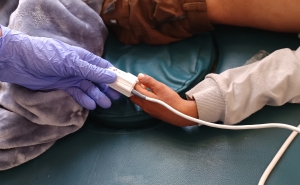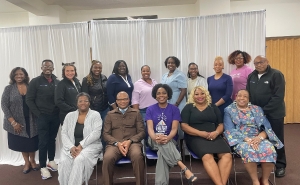Bloomberg School Faculty Member, AIDS Researcher and Human Rights Advocate Chris Beyrer Among Finalist To Head UNAIDS
Chris Beyrer, MD, MPH, a longtime faculty member at the Johns Hopkins Bloomberg School of Public Health, globally recognized AIDS researcher and advocate, and former president of the International AIDS Society (IAS), is among five finalists to lead the Joint United Nations Programme on HIV/AIDS.
Beyrer has been at the forefront of AIDS advocacy and research since the start of his career. An outspoken advocate and champion of human rights, Beyrer has extensive experience conducting international collaborative research and training programs in HIV/AIDS and other infectious disease epidemiology, HIV preventive interventions, including vaccine clinical trials and preparedness studies, and in health and migration and health and human rights. His work spans Africa, Asia and throughout Central Asia and Eastern Europe.
Approximately 36.9 million people are currently living with HIV, and tens of millions of people have died of AIDS-related causes since the beginning of the epidemic. While significant progress has been made on HIV, with global deaths decreasing significantly in the past decade and longer life expectancies for patients who receive treatment, several regions are experiencing sharp increases in new infections and are struggling to expand both prevention and treatment.
“Chris brings extraordinary insights to the fight against HIV as a researcher, an advocate and a human being,” says Bloomberg School Dean Ellen J. MacKenzie, PhD, ScM. “Chris is a natural leader whose decades of experience in science and advocacy for human rights make him an inspired choice for this position.”
In addition to serving as president of the IAS from 2014 to 2016, Beyrer has held numerous high-level positions. He served as co-chair of the Epidemiology and Natural History Planning Group of the Office of AIDS Research at the National Institutes of Health. He also serves on scientific advisory committees for UNAIDS and the World Health Organization. He served on the Scientific Advisory Board for the President’s Emergency Plan for AIDS Relief (PEPFAR) from 2011 to 2014. Beyrer was elected to the Institute of Medicine of the U.S. National Academy of Sciences in 2014. He is the author of over 320 scientific papers, six books and numerous other publications.
Beyrer received his MD from SUNY Health Sciences Center at Brooklyn in 1988 and a master of public health from the Bloomberg School, then the Johns Hopkins School of Hygiene and Public Health, in 1991. He joined Johns Hopkins in 1992, to serve as field director for Hopkins HIV research in Thailand. Beyrer is a professor of Epidemiology, International Health, and Health, Behavior and Society at the Bloomberg School and also professor of Nursing and Medicine. He is the founding director of the Center for Public Health and Human Rights. He is associate director of the Hopkins Center for AIDS Research and an associate director of the Center for Global Health. In 2016, Beyrer was installed as the Desmond M. Tutu Professor in Public Health and Human Rights at the Bloomberg School.
“Chris has earned the deep respect of those who have fought and are fighting to save so many lives in the HIV/AIDS epidemic,” says Joshua Sharfstein, MD, vice dean for Public Health Practice and Community Engagement at the Bloomberg School. “He can bring together advocates, scientists, and policymakers in the U.S. and around the world in support of a vision of eliminating this terrible disease.”
UNAIDS, founded in 1995, works to achieve zero new HIV infections, zero discrimination and zero AIDS-related deaths. UNAIDS encompasses 11 UN organizations—UNHCR, UNICEF, WFP, UNDP, UNFPA, UNODC, UN Women, ILO, UNESCO, WHO and the World Bank—and collaborates with partners across the world towards the Sustainable Development Goal of ending the AIDS epidemic by 2030.
The outgoing UNAIDS executive director, Michel Sidibé, has served since January 2009. He was appointed the Minister of Health and Social Affairs of Mali in May.
The UNAIDS’ 44th Programme Coordinating Board (PCB) was presented with a short list of candidates for the executive director position in late June. The PCB search committee chair was next to send the committee’s report to the Committee of Cosponsoring Organizations, which will make a recommendation to the United Nations Secretary-General. The UN Secretary-General will make the final decision about the appointment of the next executive director of UNAIDS.
The full list of finalists for the UNAIDS executive director position has been reported in several news outlets.
# # #
Media contacts for the Johns Hopkins Bloomberg School of Public Health: Barbara Benham at 410-614-6029 or bbenham1@jhu.edu and Robin Scullin at 410-955-7619 or rsculli1@jhu.edu.
More from the Bloomberg School
- Visit our newsroom
- Learn more about our departments:





